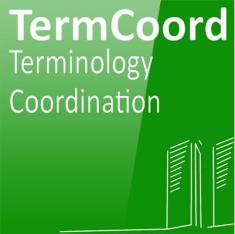 submitted by Rodolfo Maslias, Head of Unit, DG TRAD – Terminology Coordination Unit
submitted by Rodolfo Maslias, Head of Unit, DG TRAD – Terminology Coordination Unit
What we do
The Terminology Coordination Unit, known as TermCoord, coordinates the production of terminology in 23 languages of the Translation Units of the European Parliament through a network of more than 100 translators having a special terminologist profile. With this we enable a swift and efficient storage of high quality terminology in order to increase the contribution of the European Parliament to the inter-institutional terminology database IATE, which is the main source for reliable EU terminology (it contains roughly 8.5 million terms and receives on average 3 500 queries per hour from all over the world). With various topic-specific projects involving linguists, terminologists and trainees the content in IATE is constantly improved and consolidated. TermCoord welcomes trainees with interests in the field of terminology who are trained and involved in the terminology projects and all other activities of the unit.
Training, seminars and workshops
We organise terminology-related seminars for translators, interpreters and terminologists from all EU institutions, under the comprehensive title ‘Terminology in the Changing World of Translation’. These seminars regularly attract a large audience to the historic setting of the original European Parliament Chamber in Luxembourg. Our recent seminars dealt with terminology in legislative procedures, computer-assisted translation, terminology management and with lexicography and e-lexicography. The next seminar planned for 8 November 2012 will focus on neologisms in the digital age.
TermCoord also regularly organises IATE trainings for translators as well as more customized IATE workshops for terminologists, the most recent of which focused on referencing principles as well as tips and tricks for day-to-day work in IATE.
Communication, External relations and Presentations
Terminology is a dynamically evolving discipline of our age that has gained more and more importance over the last few decades. TermCoord believes that it is very important to stay up-to-date with the evolution of terminology science and practice, and to connect with the actors of this discipline in order to exchange valuable expertise and terminology material, which can be shared with our translators. For this purpose we keep in contact with a large number of universities, terminology bodies and experts through our external website, numbering now about 90 000 visitors, as well as through our memberships in important associations, such as the European Association for Terminology (EAfT) and the International Network for Terminology (TermNet). Our FaceBook Page is another important means of communication.
We regularly publish posts on current issues related to terminology; we provide a wide range of useful information, material and resources related to terminology and translation; we publish material from seminars, workshops and training sessions, as well as links to important terminology databanks and other terminology-related sites. Furthermore, our website contains a number of other interesting items such as terminology and translation book reviews, information about international conferences on terminology and translation, information about traineeships and study visits within the Parliament and theses on terminology like the one written by our former trainee under the supervision of Professor Budin: ‘Role of TermCoord in the European Parliament’ (2012).
As part of our external networking and cooperation activity, we participate in several conferences and we welcome visiting groups from universities, presenting DGTRAD and its terminology work. Some examples:
• presentation at JIAMCATT in Turin and Luxembourg,
• presentation at the 8th International Conference on Terminology in Athens,
• presentation at the terminology department of FAO in Rome,
• presentation at the Terminology and Knowledge Engineering conference (TKE 2012) in Madrid,
• visits from the universities of Magdeburg, Saarbrücken, Heidelberg, Zadar, the TERMISTI research centre and the UN Department for Translation and Terminology.